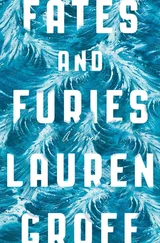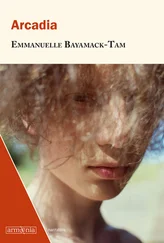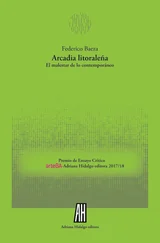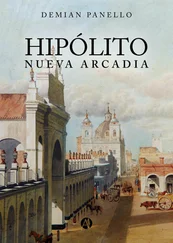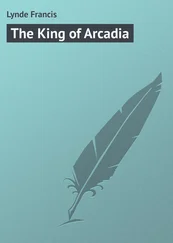Remembering this, he feels the old, hot prickle in his eyes. He thinks, Yes. But it vanishes. His angry heart calls for his attention, a fist on the door of his ribcage, beating.
Over squash ravioli and the tender new vegetables from the farmers’ market, Bit says to Grete: The sharpness of radishes on the middle of the tongue. A hot shower after a cold day. Feeling how strong you are when you squeeze my neck. A spritz of lemon in my water.
Grete has stopped eating. She is staring at her father.
The taste of an icicle, he says. The feeling of floating in a pond. A chocolate Kiss in its little foil wrapper. He smiles.
Grete says, slowly, Pumpkin pie? And when a puppy licks you on the mouth?
When a cashier’s hand touches yours when they hand back change, Bit says.
The way Hannah smells, says Grete. Abe’s funny little knock knees. Pom-poms!
And his daughter is off, so excited she is standing on her chair, invoking the tiny domestic gods of grape cough syrup and Japanese beetles and the cedar bed in the preschool’s hamster cage. Bit thinks of Helle, the long, dark path she had been for him and how the light at the end of it was this plump blondie just now spraying pesto on the floor.
Sylvie comes into his office without knocking, and locks the door behind her. He sits back. He should be grading portfolios but, with astounding inappropriateness, has been reading Duras’s The Lover again. It was Helle’s favorite book. He puts the book under his files, but Sylvie teases it out. She leans on the desk beside him, her legs long and pale and bony, and he thinks of the chill outside, the sleet coming down and the sludge coating the sidewalks, the goosebumps she would wear on her skin. She reads, making a moue with her lips. Her hair seems excessively clean. If someone drew lines between the moles on her face, there would be the Big Dipper on her cheek and chin. He waits. She puts the book down, bracelets clinking.
You know, she says. After you’ve graded my portfolio, you’re no longer my professor.
I’ve graded it, he says. A-minus.
When she looks hurt, he sits back. What is it about this girl that makes her so easily wounded? How easy it would be to take his anger out, to crush something good in her. There is a piece of him that is sorry she isn’t five years older, that would find her a fascinating woman when she’s been more toughened by time. Something in her could soothe him.
Well, she says. As I said, you’re not easy.
Right now I’m distinctly uneasy, he says, trying to lighten things.
She slides a foot between his. Good, she says and leans forward, her mouth coming close. He can smell the cinnamon on her breath and, deeper, the coffee.
Oh, honey, he says. No. You’re lovely, but no.
Why? she says. I’m of age. You’re not my professor.
I’m not that kind of man, he says. And you remind me of someone.
Who? she says.
Me, he wants to say. He smiles at her.
My wife, he says. When she was a little younger than you.
She leans back, chewing her lip, thinking this over. She looks as if she’s going to mention Helle’s disappearance, and he is grateful when she retracts the thought. She says, I don’t think I mind. She flushes when she holds the book up. To be a mistress. Fine with me.
I mind, he says.
I don’t get it, she says, her eyes shining. It doesn’t have to mean anything.
He takes her hands in his and leads her to the hall. He kisses both of her moist and shaking palms. The smell there, photographic chemistry, touches him.
All the more reason to refrain, he says and shuts the door.
Spring a stirring of the world’s optimism. Inside him, too, a tendril grows. He sees women every day in their too-early espadrilles and hopeful light coats. Soon, soon, he will approach one over the protestations of his shy heart and begin a conversation. You should always wear flowers, he’ll say to one, pretty in a floral blouse. Or, if that’s too embarrassing, maybe a simple Hello, like a window thrust open.
There is a whiteout, then a thaw. Hannah returns to Abe in their little Green house in the woods, telling everyone, My husband couldn’t live without me, though Bit knows it was mutual. The desert’s broad heavens, full of vultures, were sucking her dry.
In the mail one day, a shattering surprise: a letter from a lawyer, a clipping of an obituary, Ilya, so young and so beautiful in the picture, his face soft with hope.
Bit goes in to see the lawyer and emerges with a bouquet of papers and a key.
At home, he goes over and over what had happened and only ends up more confused. The house in Philadelphia is more than enough, but there also is a small amount of money. Bit’s head swims for days.
He and Grete run through the old brick house on the weekend that they sell it. The cleaners have been in, and the place no longer stinks of cigarettes and sorrow. For a moment, he can see their lives in Philadelphia spinning out before them, a parallel existence, bright and good in this house with its original hardware and picture rails. He has a great urge to call the Realtor, to throw everything up, to move to this smaller city, this slower one.
He knows he won’t. If they moved, Helle wouldn’t be able to find her way back to them. He opens a door to the garden, and the winter light and cold air pour in. Sun falls onto the old floorboards, and his daughter spins and spins and spins into the light, out of it, into it again, her red skirt flaring, ablaze.
Newly flush, he says to Grete, Where do you want to go for vacation? He knows she will say Grannah and Grumpy’s. Arcadia.
But she surprises him. She considers her toes. At last she says, Greece, shyly, watching him from under her brow.
He carries his bemusement with him for an hour, and when he understands, he is on the subway among all the pressing anonymous bodies. Helle. The story, Hellespont. In his daughter’s mind, Helle is infinitely falling from the back of the golden ram and through the air, a coin tossed, winking and cheery, into the water below.
They can wound, stories, they can blister. He had begun one that night he fell in love with Helle again in the gallery. It went like this: a vast expanse of time unrolling before them, he waking to Helle’s sour breath and rumpled hair every morning, making one Grete or even two, Helle’s and Bit’s bodies aging over endless mugs of coffee, endless dinners, the days shortening as they grow old, the pair at last helping each other gently into death. He lost this story the night she left. Now time stretches just as vast, but he doesn’t know what he should do. He doesn’t know what magic words are necessary to get their story back, to return her from her chosen darkness.
Up near the stone farmhouse during their year away from everything, there was a little river that cupped a spit of land that they could walk out onto. After heavy rains, the river overran the bank so that the spit became an island. Out there was the frantic smell of spring, all mud and buds, the broad slow swoop of clouds. The wind was rougher, without the trees to moderate it.
Helle and Bit would wade out with a picnic and lie in the sun and swim in the frigid river.
There was a moment on that island that lives in him when he rises in the morning, when he showers, when he walks, when, as now, he wakes to the devastating night.
Over and over, he sees Helle pulling herself up out of the river, hair sleeked, water coursing in glad drops over her skin, a flush from the cold across the whole white stretch of her. The chill sun loves her, touches her, plays prisms on the fine hair on her arms.
Are you happy? he says, inches from Helle’s mouth.
I’m so happy, she whispers. Her cold breath, her cold skin. Her cold lips upon his.
Читать дальше
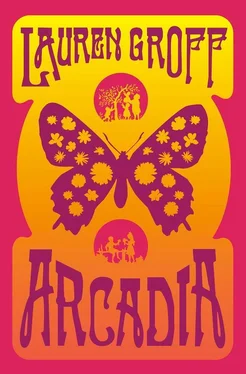
![Andrea Höst - In Arcadia [Touchstone - Extras]](/books/56405/andrea-host-in-arcadia-touchstone-extras-thumb.webp)

